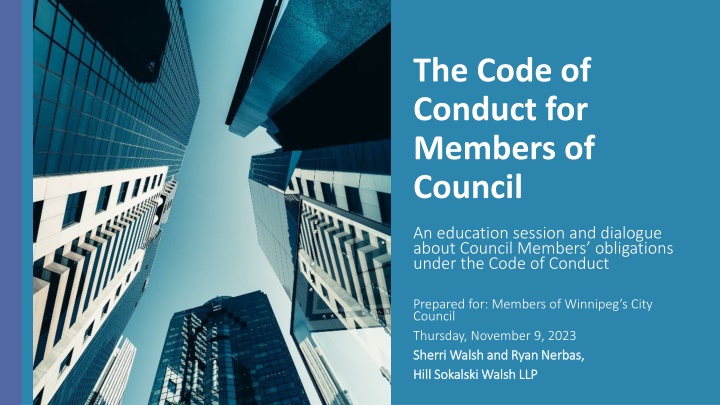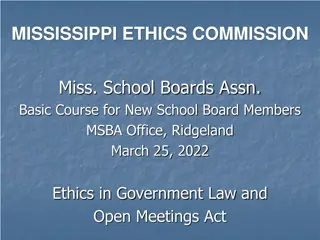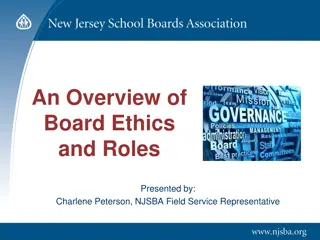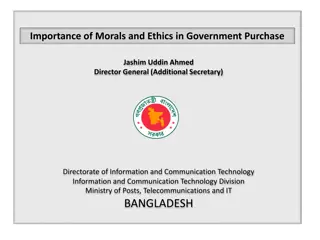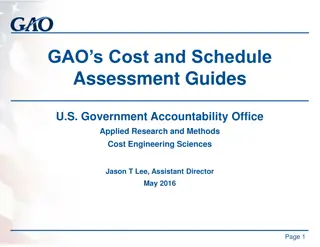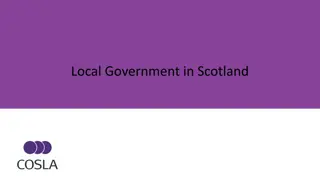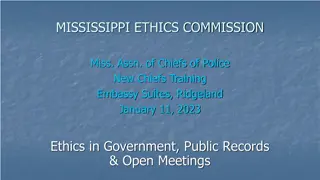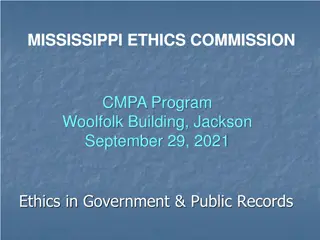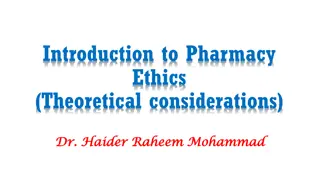Ethics and Accountability in Government: A Guide for Council Members
Explore the importance of ethics and accountability in government, focusing on the obligations of Council Members under the Code of Conduct. Learn about integrity, public trust, and ethical duties required of public officials to build public confidence and ensure responsible decision-making.
Download Presentation

Please find below an Image/Link to download the presentation.
The content on the website is provided AS IS for your information and personal use only. It may not be sold, licensed, or shared on other websites without obtaining consent from the author.If you encounter any issues during the download, it is possible that the publisher has removed the file from their server.
You are allowed to download the files provided on this website for personal or commercial use, subject to the condition that they are used lawfully. All files are the property of their respective owners.
The content on the website is provided AS IS for your information and personal use only. It may not be sold, licensed, or shared on other websites without obtaining consent from the author.
E N D
Presentation Transcript
The Code of Conduct for Members of Council An education session and dialogue about Council Members obligations under the Code of Conduct Prepared for: Members of Winnipeg s City Council Thursday, November 9, 2023 Sherri Walsh and Ryan Nerbas, Sherri Walsh and Ryan Nerbas, Hill Sokalski Walsh LLP Hill Sokalski Walsh LLP
Ethics and Accountability Frameworks- First Principles An effective democracy requires that the public have confidence in the actions of its elected officials. 2
Integrity "Government ethics is not about being "good" or " a person of integrity".... In fact, conduct that is praiseworthy outside of government , such as helping a family member get a job or returning a favor one has been given, is considered wrong in a government context. Government ethics is about acting responsibly and professionally, as a government official or employee, under certain circumstances and following certain rules and procedures. It is about preserving institutional rather than personal integrity. Government ethics decision-making should be just another professional routine. Robert Weschler: Local Government Ethics Programs In a Nutshell, City Ethics Inc., 2013. 3
Public Trust Three primary ethical duties required of public officials: 1. Do not abuse the public s trust that you will put the public interest before your private interest; 2. Act impartially when carrying out programs which are established by law; and 3. Account to the public for your activities and decisions. 4
Public Trust "The proper operation of our city's government requires: That its public officials and employees act as fiduciaries entrusted with and responsible for the property and resources of the community; That they make governmental decisions and policies in the proper channels of the government structure , free of coercive or other improper influence; That they use their position in the best interests of the city rather than for personal interests, whether their own interests or those of their family, friends or business associates; and That they do not, directly or indirectly, in a positive or negative sense, treat anyone preferentially, that is, other than in a manner generally accorded to city residents. Robert Weschler, Model Municipal Code of Ethics, City Ethics Inc., 2006 5
Ethics and Accountability Frameworks Establishing a formal ethics and accountability framework allows for ethical issues and complaints about the conduct of members of Council, to be dealt with in a professional, fair and consistent manner. The City of Winnipeg s ethics and accountability framework includes: a Code of Conduct which contains a mechanism for accepting, investigating and reporting on complaints made about the ethical conduct of members of Council; and an Integrity Commissioner who performs the dual role of providing advice about compliance with the Code and objective scrutiny of whether an elected official has met the standards set out in the Code. 6
City of Winnipeg Integrity Commissioners Mandate https://www.winnipeg.ca/council/integritycommissioner/ Advisory provide advice to Members of Council and Council as a whole on questions under the City s Code of Conduct. Investigative investigate complaints and conduct inquiries into whether a Member of Council has contravened the City s Code of Conduct Educational publish annual reports on the work of the office of the Integrity Commissioner, including examples in general terms of advice rendered and complaints received and disposed of. Other oversee the City s Lobbyist Registry 7
Integrity Commissioner Created in 2017 Independent of Council Intended to encourage and sustain a culture of integrity and accountability for the members of Council of the City of Winnipeg. Functions of the role: assist in the development of the ethical framework by suggesting content and commentary for Codes of Conduct; conduct education and training for members of Council and outreach for members of the community; provide confidential advice and guidance to members of Council to support compliance with the Code; investigate allegations that a member of Council has fallen short of compliance with the municipality s ethical framework and where appropriate, submit public reports on their findings and make recommendations, including recommending sanctions, that support the public interest. 8
Integrity Commissioner Members are required required to meet at least once annually with Integrity Commissioner Members are encouraged may obtain binding written advice encouraged to seek advice from Integrity Commissioner on a pro-active basis and 9
Measurements of Success 1. How often the Integrity Commissioner is contacted by members of Council for advice; 2. How well members of Council understand their ethical obligations; 3. How willing members of Council are to engage with the Integrity Commissioner. Despite what the general public may perceive, the following are not success: not measurements of number of complaints received; number of complaints investigated; or number of published reports finding a breach of the code. 10
Code of Conduct for Members of Council for the City of Winnipeg Set of rules which reflects the values and principles to which all members of council agree to adhere. As such is a strong statement from Council made with the intention of promoting public confidence in government. 11
Code of Conduct for Members of Council for the City of Winnipeg https://www.winnipeg.ca/council/integritycommissioner/pdfs/CodeofConduct.pdf Enacted pursuant to Members of Council Code of Conduct By-law No. 19/2018, effective February 22, 2018 Replaces 1994 Code of Conduct This Code was developed and passed in collaboration with all then-sitting Members of Council for the City of Winnipeg Since first being enacted, the Code has been amended in 2018, 2019 and 2022. Further amendments are being recommended in 2023 12
The Code and Expectations Elected officials need to know what is expected of them. While it is not possible to predict every factual situation to which a code will be applied it is important to import some level of certainty into the provisions of a code of conduct. Otherwise it is back to the Chancellor sfoot . This is why the broader principles that are set out in a code of conduct, for example, in the Preamble or in a statement of Key Principles, while there to assist in interpreting and applying the code cannot be the subject of stand-alone obligations, the breach of which amounts to a contravention of the code. Only the rules in the code, therefore, are capable of being the subject of a complaint investigation which may lead to finding that the code has been breached and sanctions are recommended. 13
The Code- Preamble A A. . PREAMBLE PREAMBLE Members of Council for the City of Winnipeg recognize that they hold office for the benefit of the public and that their conduct must adhere to the highest highest ethical ethical standards standards, exceeding exceeding the the minimum minimum obligations obligations required by law. A written Code of Conduct demonstrates that Members of Council share a common obligations which are essential to the fair fair and common understanding understanding of the ethical government. and effective effective operation operation of of government Members of Council first instituted a Code of Conduct in 1994. This Code of Conduct stems from the principles set out in that Code. Although the Preamble Key Principles listed below, it provides a helpful Council. Preamble cannot cannot support support a a stand stand- -alone helpful framework framework within which to review the actions of Members of alone contravention contravention of the Code of Conduct, together with the To further assist Members of Council and members of the public in understanding and interpreting the Code of Conduct, the Code of Conduct document shall be made available in a version which includes commentary provided by the Integrity Commissioner. commentary That commentary, which will be updated from time to time by the Integrity Commissioner, does not form part of the Code of Conduct itself. 14
The Code- Key Principles The public interest is best served when Members: perform their duties of office honestly transparency transparency, putting the public interest before private and self-interest; honestly and with integrity, integrity, impartiality impartiality and and conduct themselves in such a way as to promote municipal government; promote respect respect for Council and serve their constituents and the City in a conscientious approach decision making with an open conscientious and open mind mind; and and diligent diligent manner manner and perform their duties of office and manage their private interests in a manner that promotes promotes public public confidence confidence and and trust trust in the political process. 15
The Code- Rules of Conduct Members are bound by 11 11 Rules Rules of of Conduct Conduct 1. Confidential Information 2. Conflict of Interest 3. Fundraising 4. Gifts and Benefits 5. Use of Influence 6. Use of Staff, Resources and Property 7. Election-Related Activity 8. Conduct Concerning Staff 9. Respectful Conduct 10. Adherence to Council Policies and Procedures 11. Reprisals and Obstruction This presentation will focus on a few of the most commonly engaged rules. 16
Rule 2 Conflict of Interest 2 2. . Conflict Conflict of of Interest a. Members must not act in situations in which they have a real or apparent conflict of interest, whether during a meeting of Council or Committee of Council or at any other time while performing their duties of office. i. A conflict of interest exists when a Member exercises their duties of office and at the same time knows that in the performance of those duties there is the opportunity to further their private interests. Interest Private Private Interest an interest: (a) in matters of general application; (b) in matters that affect a Member as one of a broad class of the public; (c) that concerns the remuneration and benefits of the Member as a Member of Council; or (d) that is trivial. Interest includes any personal benefit, whether or not pecuniary, but does not include A Member who has a conflict of interest with respect to any matter must refrain from influencing the matter and from discussing or voting on any decision with respect to the matter. Should a conflict of interest, real or apparent, arise with respect to a matter that will be discussed or determined at a meeting of Council or a Committee of Council, the Member must: i. disclose the general nature of the Member s interest, and ii. withdraw from the meeting without voting or participating in the discussion. 17
Rule 2 Conflict of Interest Exceptions under the Code: privateinterest does not include an interest: (a) in matters of general application; E.g., matters pertaining to proposed changes to prescribed fines under municipal by-law enforcement (b) in matters that affect a Member as one of a broad class of the public; E.g., matters related to proposed roadworks on a commuter route used by the Member (c) that concerns the remuneration and benefits of the Member as a Member of Council; or (d) that is trivial. 18
Rule 2 Conflict of Interest Conflicts happen- the fact that a conflict exists is not in itself generally a problem What matters is that the Member recognizes the conflict and deals with it in an ethical manner. Members that are in a conflict of interest (real or apparent) must refrain from influencing the matter and from discussing or voting on any decision with respect to the matter. For example, Member A plays recreational hockey at a local community centre. A vote that will uniquely impact that community centre is before council. The vote will not result in any financial impact to the Member. Nonetheless, the Member may have a private interest in ensuring a favourable disposition for the community centre and should therefore recuse themselves from voting. 19
Conflict of Interest Legislation Be aware! The Municipal Council Conflict of Interest imposes a mandatory office office if an application is made to the court that satisfies a judge that a violation of this legislation has occurred. mandatory disqualification disqualification from from This legislation is only concerned with pecuniary in nature. pecuniary (monetary) interests, both direct direct and indirect indirect This is not regulated or enforced by the Integrity Commissioner. Nevertheless, Members must be aware of and familiar with it. 20
Conflict of Interest Legislation Exceptions under the MCCIA: Interests that do not exceed that of an ordinaryresident ; Interests that do not exceed $500; or Unknowing or inadvertent breach 21
Recent Examples- Breaches Whitestone, Ontario, Councillor Lamb, January 11, 2022 Member and his spouse owned lots in subdivision and brought application to create right-of-way in subdivision before council. Declared pecuniary interest, but continued to chair meeting and answered questions from the public. Did not vote on matter, but was seen as trying to influence vote. Ottawa, Ontario, Councillor Harder, June 17, 2021 Member hired registered lobbyist and his daughter to work for the Member s office while the lobbyist represented private planning clients at City Hall and personally represented them at the committee the Member chaired. Calvin, Ontario, Councillor Grant, February 9, 2021 Member s wife had interest in matter before Council. Member received advice from IC to recuse, refrain from voting or influencing. Member nevertheless failed to declare a conflict, remained in the room and participated in the vote. 22
Rule 4 Gifts and Benefits Officials are merely part of the government, individuals sitting in government positions at the moment. They are doing, or supposed to be doing, nothing but their government work, and to be paid nothing but what the budget says they are paid. In other words, officials do not personally act and should not personally benefit from what they are required to do as part of their public role. They should not be given special treatment, that is, no tickets, invitations to play golf or go on a vacation, or the like, because they should do nothing special for anyone. They should not be involved in reciprocity or feel gratitude to anyone in their role as an official. Robert Weschler, Cityethics.org 23
Rule 4 Gifts and Benefits Any gift or benefit which might reasonably be seen to have been given to influence the Member in the exercise of a duty or function of his or her office should not be accepted. A Member s family member or staff should not accept gifts which give the same appearance. The Code addresses gifts in two ways: by regulating what is acceptable; and by requiring public disclosure of gifts that are offered. 24
Rule 4 Gifts and Benefits What is generally acceptable? Authorized political contributions Volunteer services Admission to charitable events in your official on the event Small gifts/benefits of token value that are a normal expression of courtesy i.e., pens, key chains, light refreshments official capacity capacity offered by the organization that is putting Disclosure Members must provide a quarterly disclosure statement of gifts exceeding $50.00 in value. Even if you do not keep the gift, you need to disclose the fact that the gift was offered along with what you ended up doing with the gift (i.e., whether you returned it). That statement becomes a matter of public record. 25
Gift Scenarios - Quiz A. Are these gifts acceptable under the Code? B. If so, should you disclose the gift? Source Source Nature of Gift/Value Nature of Gift/Value Reason Reason Recipient Recipient Local Health Charity Bouquet of Flowers/$40 Raising awareness for fundraising drive Member Chain Restaurant Gift cards/$200 Opening of new location downtown Member/Staff Cultural Festival VIP Passes/$250 No reason given/use as see fit Member/Family Trade Convention Plated dinner & entry to Gala/$150 Ribbon cutting /remarks as Member Member Property Development Firm Luxury Box Tickets to Sports No reason given/use as see fit Member/Family Event/$500 Financial Services Institution Case of wine/$200 Holiday gift Member/Staff 26
Examples- Breaches Toronto, Ontario, Councillor Ford, January 28, 2016 Then-Councillor accepted tickets to tennis tournament and dinner from a lobbyist. Toronto, Ontario, Councillor Palacio, January 9, 2008 Member accepted offer from constituency office property owner to pay well-below market rate for office rent. Blue Mountains, Ontario, Councillor Seguin, April 6, 2018 Member accepted donations made to his lawyer towards his personal legal fees accrued in litigation involving the municipality. 27
Rule 5 Use of Influence Members of Council have a great deal of influence by virtue of their position. That influence must only be used for the proper exercise of their duties duties of of office office. Duties Duties of of Office namely participation in activities relating to the proceedings and work of Council and activities undertaken in representing the City or the Member's ward or constituents but do do not not include include: Office are the duties and activities that relate to the position of the Member, activities related to the private interests of the Member; a Member's election-related activities; and activities including fundraising activities designed, in the context of a federal, provincial or municipal election, or any other local election, to support or oppose a political party or an individual candidate. 28
Examples- Breaches Nairn and Hyman, Ontario, Councillor MacDonald, March 21, 2021 Member routinely used his position as Councillor to demand services from Council and/or municipal employees for his own personal benefit. Mattawa, Ontario, Mayor Backer, December 10, 2020 Mayor used his position to protect his family member (municipal employee) from discipline in the workplace. Richmond Hill, Ontario, Councillor Muench, March 11, 2021 In an effort to stop what he thought was a burglary in-progress, Member entered private property without permission and remained when told to leave by property owners, referred to himself as the government and thelaw . Hamilton, Ontario, Councillor Whitehead, December 11, 2020 Member used his title as Councillor and City email address to threaten local business owner and demand refund. 29
Rule 8 Conduct Concerning Staff Conduct Conduct Concerning Concerning Staff Staff a. Members must not directly or indirectly, request, induce, encourage, aid, or permit staff to do something which, if done by the Member, would be a breach of this Code of Conduct. b. Members must not compel staff to engage in partisan political activities or subject them to reprisal of any kind for refusing to engage in such activities. c. Members must not use, or attempt to use, their authority for the purpose of intimidating, coercing, or influencing staff with the intent of interfering with such staff s duties. d. Members must not maliciously or falsely impugn or injure the professional or ethical reputation or the prospects or practice of staff and must at all times show respect for staff s professional capacities. 30
Key Relationship between Council and Staff The relationship between any municipal council and its professional public service is critical to the overall success of local government. Valerie Jepson, Integrity Commissioner for the City of Toronto, Report Regarding the Conduct of Councillor Josh Matlow, June 18, 2019 at p. 9. 31
Distinction between Council and Staff Municipal civil servants work for Council as a whole; they do not work for the mayor, or committee chairs, or any individual councillor. The roles of council members and administration legally and practically are separate. The purpose of council is to govern and lead the community from the perspective of locally elected politicians. It is the job of each council member to reflect and represent public issues and concerns to the rest of council. The role of administration is to provide council with wise advice as to what needs to be done, and then to carry out the wishes of council in an effective, efficient and sensitive manner. George B. Cuff, Council & Administration: Distinction of Roles , 114 Municipal World (October 2004) No. 10, 39-40 at 39. 32
Regulation of Conduct Towards Staff Members should not try to circumvent the Code by asking or suggesting that staff do something that would be unethical for the Members to do themselves. Members must be respectful of staff s role to provide advice which is based on political neutrality, objectivity and expertise and without undue influence from any individual Member or faction of council. Members are still entitled to express criticism in a respectful manner based on factual matters. It is not appropriate for a Member to attempt to influence staff to circumvent normal processes or overlook deficiencies in a file or application. It is also inappropriate for Members to involve themselves in matters of administration or departmental management which fall within the jurisdiction of the Chief Administrative Officer and staff. 33
Examples- Breaches Hamilton, Ontario, Councillor Whitehead, November 3, 2021 Member engaged in hostile cross-examination style of questioning while staff member was presenting a report to Council. Cornwall, Ontario, Councillor Towndale, February 24, 2021 Member made social media posts regarding the resignation of the municipality s fire chief. This was a direct criticism of staff made in a forum and in a context where it cannot be interpreted by any third party as anything other than a criticism. Norfolk County, Ontario, Mayor Chopp, April 9, 2019 Mayor made a scene of ripping a staff report in half during an open public meeting where that staff member was in attendance to present that report to Council. Toronto, Councillor Ford, October 23, 2012 Then-Councillor made comments about senior staff member on radio show, asked rhetorically how does (staff member) still have a job? 34
Rule 9 Respectful Conduct (Current Rule) Respectful Conduct a. All Members have a duty to treat members of the public, one another, and staff with respect and without abuse, harassment, or intimidation. Harassment includes: i. any behaviour, whether a single incident or a course of conduct, that a reasonable person should have known would be unwelcome, and that is inappropriate, demeaning, humiliating, embarrassing, or otherwise offensive, including but not limited to: a. verbal or written insults, abuse or threats; b. racial or ethnic slurs, including racially derogatory nicknames; c. leering or other offensive gestures; d. bullying; or e. patronizing or condescending behaviour; and ii. objectionable and unwelcome sexual solicitations or advances. b. While Members may passionately debate issues and promote ideas, they must maintain proper decorum during meetings of: Council, Committees of Council, and boards, agencies or commissions on which they serve as part of their duties of office. 35
Rule 9 Respectful Conduct (Proposed Change) Respectful Conduct a. All Members have a duty to treat members of the public, one another, and staff with respect and without harassment or sexual harassment. Harassment means any behaviour, whether a single incident or a course of conduct, that a reasonable person should have known would be unwelcome, and that is inappropriate, demeaning, humiliating, embarrassing, or otherwise offensive. Sexual harassment means unwelcome conduct of a sexual nature, including: i. any conduct, whether a single instance or a course of conduct, directed to or about an individual because of sexuality, sexual orientation, gender identity or expression, that is committed, threatened or attempted, that a reasonable person should have known to be unwelcome; ii. a sexual solicitation or advance made by a person who is in a position to confer any benefit on, or deny any benefit to, the recipient of the solicitation or advance, if a reasonable person should have known that the solicitation or advance is unwelcome; or iii. a reprisal or threat of reprisal for rejecting a sexual solicitation or advance. b. Council and Committees of Council. The Integrity Commissioner will generally not accept a complaint about a Member s conduct if it has already been dealt with by the Speaker or Presiding Officer of the relevant meeting of Council, or a Committee of Council. While Members may passionately debate issues and promote ideas, they shall maintain proper decorum during meetings of 36
Harassment Key consideration: whether the conduct is unwelcome or unwanted . Objective standard: is it reasonable to conclude that a reasonable person knew or ought to have known that the conduct was unwelcome or unwanted in the circumstances? There is no bright line between what is harassing and what is not. Context is important. What might constitute harassment: Rude, degrading or offensive remarks Intimidating gestures Discrediting a person by spreading rumours or gossip Ridiculing, humiliating or calling into question a person s integrity Unwanted sexual advances What might not constitute harassment: Friendly gestures among colleagues such as a pat on the back Passionate debate in the Chamber unkind or insensitive comments or actions that may not rise to the level of harassment 37
Workplace Harassment The rationale for requiring decorum in Council and Committee meetings was well stated in the Commission Report of The Honourable Madam Justice Denise E. Bellamy (Toronto Computer Leasing Inquiry/Toronto External Contracts Inquiry, 2005): Ill-mannered behaviour impedes the effectiveness of Council as a decision- making body and diminishes the stature of Council in the eyes of the public. Principled criticism of others positions is to be expected at times, but it should be delivered respectfully and civilly. Angry or abusive language and personal attacks are inappropriate at all times. 38
Conduct in the Chamber under the Code Rule 9 provides the Integrity Commissioner with the jurisdiction to investigate complaints regarding conduct that occurs in the Chamber. However, the Integrity Commissioner will generally not accept a complaint about a Member s conduct if it has already been dealt with by the Speaker or Presiding Officer of the relevant meeting of Council, or a Committee of Council. It is not the Integrity Commissioner s role to stifle passionate debate in the Chamber, so long as the conduct does not rise to the level of a breach of the Code. 39
Conduct in the Chamber- Procedural By-Law no. 50/2007, s. 9 The Presiding Officer (generally, the Speaker) has jurisdiction to maintain order and decorum in the Chamber and has broad powers to take such actions as circumstances warrant to maintain order and decorum in the Chamber Act of harassment whether personal, sexual, racial or otherwise may lead to the Presiding Officer naming the offending Member. The Member must then immediately cease and desist from any further acts of harassment. Further acts will result in an ejection from the Chamber. 9 9( (17 17) ) When a member is addressing the Council the member (a) shall not speak disrespectfully of Her Majesty the Queen or her official representatives; (b) shall not use offensive words in referring to any member of the Council, or to any officer or any employee of the City; (c) shall not indulge in personalities in the course of debate nor reflect on the motives of members who may have voted for a particular motion; (d) shall not use profane, vulgar, offensive, threatening or intimidating language. 40
Examples- Breaches Sarnia, Ontario, Councillors Burrell and Dennis, July 20, 2022 Members behaviour towards a trainer during a diversity/equity training seminar was hostile to the point of her feeling unsafe , caused her significantharm . Edmonton, Alberta, Councillor Janz, July 4, 2022 Member retweeted a post that contained a comment referring to police officers as pigs ReTweeting has the same effect as a republication of the original Tweet. It is reasonable to conclude that when someone reTweets without commentary, they are implicitly expressing their agreement with the content of the Tweet. The reTweet also results in broader dissemination of the content of the Tweet. Amaranth, Ontario, Mayor Currie, April 26, 2022 Mayor regularly raises his voice, talks over others, yells during meetings, engages in name-calling Storming out of a meeting in a fit of anger is disrespectful, lacks decorum and does not reflect the conduct expected of members of municipal councils Calgary, Alberta, Councillor Woolley, April 9, 2021 Member called fellow Member an ignorantmoron in a tweet. 41
Social Media The Integrity Commissioner published an Advisory Bulletin on Council Members Use of Social Media in February 2021 https://legacy.winnipeg.ca/council/integritycommissioner/pdfs/AdvisoryBulletin- SocialMediaandCodeofConduct.pdf The Code applies to a Member s social media activity where the activity is about any of the following: Council; their work and role as a Council Member; other Members of Council; or the business of the City It is the use of the account that is important- not the name given to the account Members are encouraged not to mute or block other accounts unless necessary, but Integrity Commissioner will not accept complaints about muting/blocking unless the manner in which it is done otherwise breaches the Code 42
Advice Procedures Appendix A Members are encouraged to seek the Integrity Commissioner s advice on a proactive basis. Written advice is binding as long as facts presented are accurate. General and anonymous summaries of advice provided to Members may be included in Annual Report Advice may be reconsidered and member will be informed. Original advice stands unless and until amended. General advice will only be given informally, and is subject to change. Will not advise as to whether past conduct was a contravention of the Code. Can only provide general information about how to act in the future. Advice cannot be used by a member to attack or malign behaviour of another member. Advice is confidential (subject to disclosure required by law), unless: reported following investigation of complaint the member makes the advice public (if a portion is made public, the entirety may be disclosed.) 43
Enforcement of the Code Promotion of an ethical culture is better achieved through the ability to provide advice and education rather than through the investigation of complaints and imposition of sanctions for misconduct. The The purpose purpose of of the the complaint complaint process process is is remedial remedial rather rather than than punitive punitive. . All complaints, whether formal or informal, may be resolved informally, i.e. without conducting an investigation, publishing a report and requiring council to determine sanctions. Education is achieved through public reporting in the Annual Report about the nature of complaints received and how they were resolved. 44
What to Expect in the Event of a Complaint A. Informal A. Informal B. Formal B. Formal Facilitated discussion Triage No jurisdiction Successful resolution Unsuccessful (may file formal complaint) Investigation Investigation Out of time Frivolous No useful purpose Matter already pending Breach Breach No Breach No Breach No investigation No investigation Report (to council) Report (only to the parties) Dismissal letter Council deliberates on sanctions 45
Complaint Procedures Appendix B Part Part A A- - Informal Informal Complaints Complaints: integrity Commissioner may assist in informal discussion to settle or resolve the matter encouraged as first means of remedying behaviour integrity Commissioner may act as mediator participation in informal process does not preclude undertaking a formal investigation of the same matter not a prerequisite to pursuing formal complaint 46
Complaint Procedures Appendix B Part Part B B- - Formal Formal Complaints Complaints: : anyindividual may file formal complaint Details of complaint disclosed to respondent member, but name of complainant only disclosed where fairness requires it Council may also direct investigation by resolution Complaints must generally be made within 60 days after date of conduct, or 60 days after date complainant became aware of conduct Integrity Commissioner may accept complaint filed after expiry of time limit if: delay incurred in good faith; it is in the public interest to conduct an investigation; and and no substantial prejudice will result to any person because of the delay 47
Complaint Procedures Appendix B Part Part B B- - Formal Formal Complaints Complaints Continued Continued IC must conduct preliminary assessment to decide whether to investigate complaint. May refuse to investigate where: outside jurisdiction; complaint is frivolous, vexatious, not made in good faith; no/insufficient grounds, or unlikely compliant will succeed; or investigation will serve no useful purpose Where the Integrity Commissioner has declined to conduct an investigation, will provide the Respondent with both an anonymized copy of the complaint and the Integrity Commissioner's response to the Complainant. Investigation: both parties provided with details of complaint, submissions, other relevant supporting material Integrity Commissioner may seek information from anyone relevant to the complaint and may receive such information either in person or in writing Confidentiality: The Integrity Commissioner and every person acting under their jurisdiction shall preserve confidentiality of the investigation process, except as required by law and the Complaint Procedures. 48
Complaint Procedures Appendix B Part Part B B- - Formal Formal Complaints Complaints Continued Continued Reporting: if if no complainant and respondent member; it may be discussed on an anonymous basis in the Annual Report for education purposes no contravention contravention found found - no public reporting - report is only provided to the if if contravention contravention found including findings, opinion as to how member contravened code, any recommended sanctions or corrective action found, Integrity Commissioner shall report publicly to Council council shall consider and act on report forthwith. if contravention is found, identity of respondent member shall not be treated as confidential. 49
Sanctions Available sanctions for violations of the Code: Reprimand; Public apology; Return gift or benefit/reimburse donor for the value; Remove member from a committee; and Request Mayor to remove the member from their position as Chair of a committee 50
